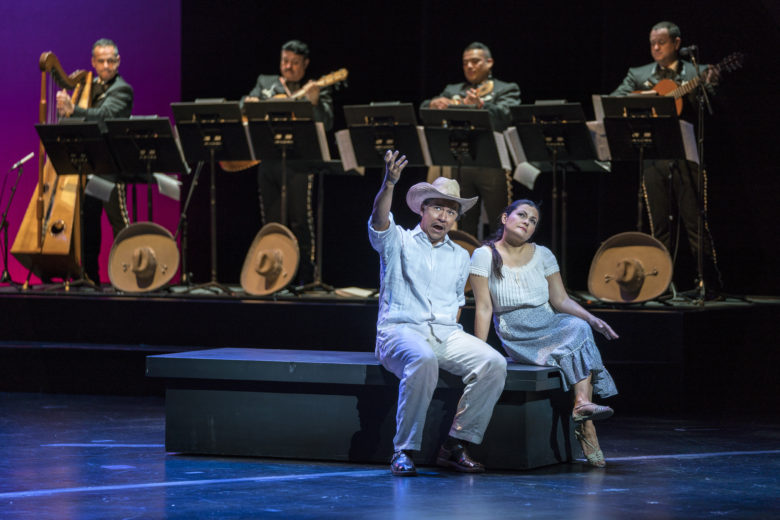
Cruzar La Cara De La Luna, produced by the Houston Grand Opera, is an opera that follows the life of Laurentino, who, upon his deathbed, reveals to his American-born son and granddaughter that he had a family in Mexico, years before he came to the United States. We then witness the tragedy of his love with Renata, and how a man-made border can destroy families with hopes and dreams who are forced to make dangerous choices just to stay together.
The uniqueness of the piece cannot be understated, as Cruzar is one of the first Spanish language operas being produced in America, and the first using mariachi music, performed by Mariachi Vargas, one of the oldest, continuously performing mariachi in the world, who play on stage, in full regalia. Like Hamilton did with the history of the American Revolution, Cruzar is popularizing opera for audiences who never previously saw themselves as being reflected in those stories.
‘LLERO had an opportunity to interview Leonard Foglia, Cruzar’s Librettist, discuss his involvement with the project, how his own immigrant history helped him relate to the immigration story of Latinos, and how the U.S. is ready for Latino-focused opera.
‘LL: Can you explain to us the role as Librettist, and what that means in opera?
LF: In this case I share the credit with Jose “Pepe” Martinez (the former musical director of Mariachi Vargas who passed away in 2016) with the lyrics, but in general the Librettist creates the story, creates the whole arc of it, and for this, I wrote all the scenes and I wrote the story, I invented the story and wrote most of the lyrics in the songs – it all comes down to words and music – I write the words and the composer writes the music.
‘LL: How did the idea of a “Mariachi Opera” come about, and how did you make sure that what you wrote would be authentic and fair to Latinos in terms of their music and representation on stage?
LF: When the former head of Houston Grand Opera first called me – he had just come from a Mariachi Vargas concert, and he said to me “What do you think of a Mariachi opera?” I had spent all those years in Mexico so I knew how emotional and story driven the music was, and I knew that was important. I asked what they wanted, and they said I could write about anything I wanted as long as it would have meaning and relevance to the Hispanic community in Texas.
My first notion was I’ll direct it, because if you want a story about Mexicans it should be written by a Mexican, but they were adamant because of other things I had written and I said, I’ll only collaborate with a Mexican because it has to be authentic, and I need somebody to make sure it’s true and authentic.
A lot of this is based on my father’s story. My father came over from Italy when he was 10 years old…he always felt displaced in this country. Once I started thinking about my father and my own upbringing, I realized that it was part of my story too and that I had a true and honest way into this story. And so I started playing with the notion of home.
There are three women that work in the costume department of Houston Grand Opera, a mother and two daughters. I sat down with them when I was first thinking about where I need to go with this story, and I said, “Where do you feel most at home?” I was stunned by their answer, they said “neither place.” They said “when we are here, we are American citizens, but we are not treated like American citizens, we are treated like foreigners. But when we go home to Guadalajara (they had just got back from a wedding) our Mexican relatives treat us like Americans, so we don’t feel at home anywhere.” And that’s when I knew this is what I wanted to write about – the sense of “where is home, is it where you are born, is it where you meet someone and get married and have children?
Leonard Foglia and cast of Cruzar La Cara De La Luna
‘LL: Why does your story focus on migrant workers and their immigrant experience?
LF: The story developed by my fascination with the Bracero program, and how those men went back and forth during the picking season, and as years went on, they would come to Texas and California to pick the fruit, and then they would learn that there was work in the winter in Chicago, and they would start coming home less and less, and they would become more Americanized. In the opera, there is a song called “Un Pueblo Sin Hombres” and Renata sings about all the half-finished houses. And that always struck me in Mexico, all the half-finished houses you would see. They start with the best intentions of sending money back and building their lives in Mexico, but as they become more American, they don’t want to go back.
‘LL: Butterflies are a recurring theme throughout the opera. What is the story behind that choice?
LF: I wanted it to be a generational opera – and I was taken by the notion of the butterflies in Michoacán, and the notion of the metaphor of how hard it is for people to get across the border, but how easy it is for the butterflies.
Leonard Foglia and Jose “Pepe” Martinez
‘LL: Based on what I know of classical theater, when the main characters die, it’s considered a tragedy. Is it because of a tragic flaw, or the circumstance that leads them down their path?
LF: The thing about Renata and Laurentino, the two main characters, is that they are good people who make bad decisions. It is about all our lives, look at all the bad decisions we make with the best intentions…He keeps going, she doesn’t want him to go, and seven years later he keeps going, staying away longer and longer, and then for all the best intentions she decides “alright it looks like our lives will be in the U.S., then we’ll just go” and we see what happens.
‘LL: There is also a secondary plot of two brothers, separated by years and borders, and their different experiences with their father. What did you want people to take away from the relationships between these three men?
LF: In this case, I specifically stayed away from the notion of someone ‘voluntarily’ having a second family – either with an affair or something. In this case it was bad circumstances that divided (Laurentino) from his son. So you have someone who has a view of his father that has given to him by his relatives, and also what he witnessed at seven years old, his mother dying in the desert trying to get to his father. For his entire life, he blames his father for it, without ever putting himself in the place of his father and understanding the pain that his father went through – that’s the thing, we only look at our own pain. One of the scenes that still gets to me is that one scene that is 25 years ago where the father goes back to track his son and the son denies him, and that’s all Laurentino ever wanted.
‘LL: What has been the reaction by Latinos to your opera. Why do you think it might appeal to them?
LF: All of those places drew out the Mexican American and Latino community in droves. What I found and I didn’t realize going in – here was a story being told, your story is being told in your language, and your musical vernacular, and that has been more powerful than I would have expected. So much of opera is filtered through the European sensibility, but here it is, it’s your music, your history, your story – it’s yours. We did this at a Lyric Opera in Chicago, a 3,500-seat opera house, the second largest in North America. It was the first time in the history of the opera company that Spanish had either been sung or spoken on that stage, ever. That’s what has been the most rewarding for me, to put that up there. It’s been beautiful to watch.
‘LL: What would you say to people, about exploring opera?
LF: I would probably take off the word “opera.” I think it interesting that in the New York Times review – the critic said “Or call it a chamber opera, or a music-theater piece. It hardly matters.” He took it for what it was – music. That meant a lot to me. Hamilton uses rap to tell a story, we use Mariachi to tell a story, all we are trying to do is tell story that will have some meaning to for people, and tell it in a musically exciting way.
‘LL: That’s pretty revolutionary, don’t you think?
LF: When we started doing this – we premiered it seven years ago, so many opera companies were very snobby about it. The first couple of opera companies presented it as a “special event” It’s very interesting to watch the evolution. First, we’d come in for a weekend, as if it were a special concert or something, but it would not be part of their season. Then a couple years ago Arizona Opera Company was the very first one actually to put it in their season. And then Fort Worth put it in their season, and now NYC Opera put it in their season, so that’s a real evolution, and what it is great for Spanish language opera, great for the Latino community.
Cruzar la Cara de la Luna is currently on Tour – Now Playing at Valley Performing Arts Center, in Northridge, CA on February 17th and 18th
